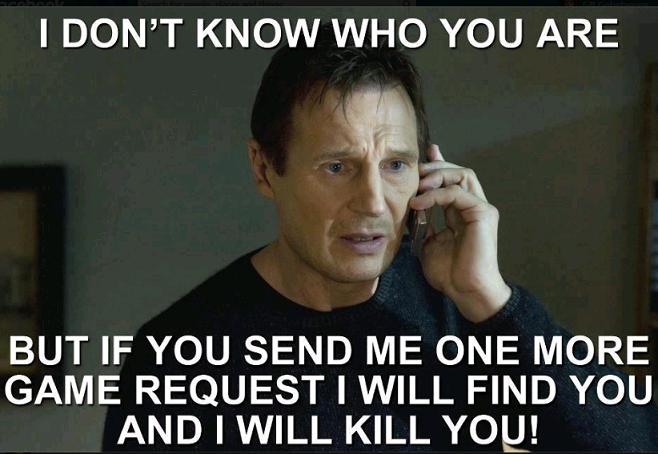And now something from the blue sky department...
I had a thought the other today, watching two people playing two tablet games. Wouldn't it be great if the players could help each other out, even though they were playing two different games?
Two *completely*, unrelated games?
 |
| Baby wants a tablet too! |
Well, here's how I imagine it could work, in very general terms. When players are in close proximity of each other (10 feet, or so), similar to the Nintendo
StreetPass/SpotPass system, the mobile devices are made to automatically communicate with each other.
The devices do this in order to trade "external power-ups" or let's say "extra-ups". This would be a form of help from each player, to the other player, in their respective games they are playing. The idea is to have players helping each other, as they sit around playing their games (imagine in the airport, or coffee shop).
Example
Imagine one player (X) is in
Cut the Rope, playing a few levels, and another player (Y) is playing an arena shooter like
Inferno Plus (also a single-player game).
 |
| Cut the Rope |
Both games are designed to handle an "external power-up" or "extra-up" from this system.
In
Cut the Rope, for instance, let's say Player X beats a level with 3 stars, then their game would automatically send an "extra-up" to anyone playing *any games* around them.
Player Y, playing
Inferno Plus on the bench nearby, could get a message like "Mike sends an extra-up!". And within
Inferno Plus, Player Y suddenly has a new shield.
 |
| Inferno Plus |
Now with Player Y in
Inferno Plus, let's say they beat a level, and now send an extra-up back to the
Cut the Rope player X, which could be a freeze-style powerup or perhaps their level slows down so as to allow player X more time to react.
Extra-Up Integration
Each game would implement what an 'extra-up' does when received from an outside player. Obviously the game could simply ignore it. Or the game could work within its particular design structure to add a very small, but still noticeable bump to the game, to the benefit of the player.
Of course, it could be much more complicated than all of this; as it could allow for more information to be sent. Perhaps a simple magnitude of help could be sent (such as a number), allowing the game to do more, if gamer X did something great, and to really help out gamer Y.
The key would be to keep it basically invisible on the players, so they don't have to do anything additional, except play their games around someone else.
Real Social Benefits?
 |
| Facebook game requests |
To me, this could invite actual, positive social benefits. Sitting next to someone playing another game, and having them help you out could naturally lead to talking about the games and potentially making a new friend. Contrast this to the feeling of being nagged by Facebook-style games, in which players are always directly asking for help through their games.
In this new "Extra-ups" situation, by design, players must be in the same physical area to get any benefits. Their games do not request anything from them, they only give positive help. Players are next to each other, able to talk and enjoy their company all the more if they so choose.
Implementation In Unity?
There *currently* are many barriers to this working. Tablets/mobile devices would have to make this an option for apps to tie into--the "always-on, light, background internet connectivity" required to notice each other in close proximity.
Another big issue would be a necessary 'platform', or SDK, or general system to tie into, for all games in the background. I can imagine Unity working well here, as many mobile games are built in
Unity. Here it could be as simple as a behavior function that is overridden, and hooked into.
Nintendo has games that use a similar system, with some games exchanging characters, scores, or even initiating special battles. But the trick to all these exchanges, is both players have to have the
same game. In this new system, the gameplay exchanged is very simple, and in some ways less impressive, but it differs in two important ways:
1. An extra-up is sent during active, current play.
2. The extra-up is not tied to the game it's being sent from, but from the game that accepts it.
Cross-Platform
And of course while we're at it, one further amazing attribute would be if this system could be cross-platform. So if player X is on an Android tablet, and player Y is on an iPad, both their games could still exchange extra-ups.
If
Unity were used, the game programming wouldn't be an issue. But I could see there being a hurdle in getting iOS devices and Android and WP devices to all 'talk' to each other in the background properly.
UPDATE:
In this article here (thanks to Jerrod Putman), it describes the app
FireChat which is using Apple's "Multipeer Connectivity Framework" to
have iOS devices see each other without wifi. It's exciting to know at
least one small piece is already in place.
http://www.theverge.com/2014/10/16/6981127/firechat-messaging-app-accidental-protest-app-hong-kong
Regardless, I wanted to get this out there as an idea--of
separate games that are able to communicate with each other to gamers' benefits. The general idea being: encourage potential socialization through gaming.


